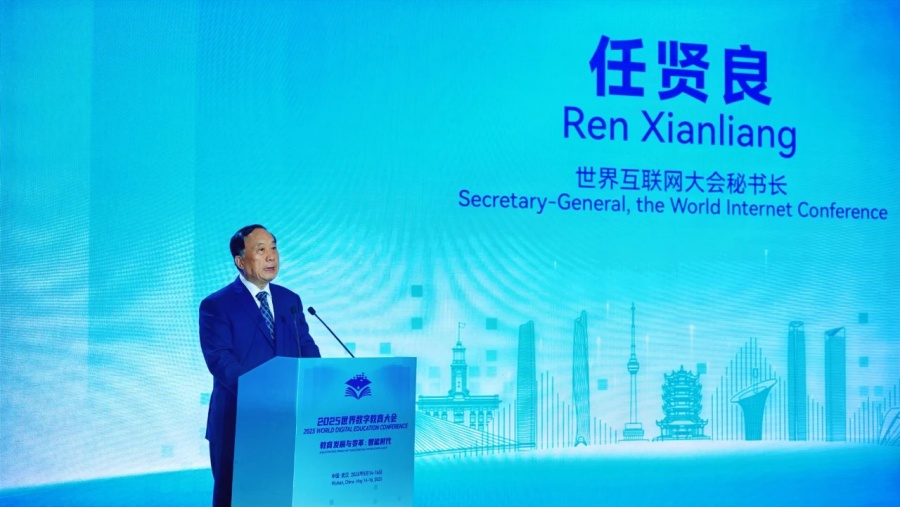
- Home
- Media Center
-
Events
- Wuzhen Summit
- Regional Forums
- Practice Cases of Jointly Building a Community with a Shared Future in Cyberspace
- World Internet Conference Awards for Pioneering Science and Technology
- The Light of Internet Expo
- Straight to Wuzhen Competition
- Global Youth Leadership Program
- WIC Distinguished Contribution Award
- Membership
- Research & Cooperation
- Digital Academy
-
Reports
- Collection of cases on Jointly Building a Community with a Shared Future in Cyberspace
- Collection of Shortlisted Achievements of World Internet Conference Awards for Pioneering Science and Technology
- Reports on Artificial Intelligence
- Reports on Cross—Border E—Commerce
- Reports on Data
- Outcomes of Think Tank Cooperation Program
- Series on Sovereignty in Cyberspace Theory and Practice
- Other Achievements
- About WIC
- 中文 | EN

Ren Xianliang speaks at World Digital Education Conference
Ren Xianliang, secretary-general of the World Internet Conference (WIC), attended the 2025 World Digital Education Conference in Wuhan, Central China's Hubei province, on May 15.

[Photo/wicinternet.org]
In his speech at the parallel session on "Digital Education Security and Ethics: Challenges, Consensus, and Actions", Ren emphasized that the continuous advancement of digital technologies, particularly artificial intelligence (AI), is accelerating global transformations in science, industry, and education. These changes are opening new opportunities for innovation in teaching models, reform in educational evaluation, and the construction of modern education ecosystems, accelerating the advancement of education into the intelligent era, he added.
He highlighted several key initiatives led by the WIC, an international organization with a long-term focus on AI development, in recent years to promote AI-assisted education, as well as AI governance.
These include the WIC Nishan Dialogue on Digital Civilization in June 2023, the release of the Developing Responsible Generative Artificial Intelligence Research Report and Consensus at the 2023 WIC Wuzhen Summit, the establishment of the WIC Specialized Committee on Artificial Intelligence at the 2024 Wuzhen Summit, and the launch of the report on Governing AI for Good and for All—Empowering Global Sustainable Development at the 2025 WIC Asia-Pacific Summit in Hong Kong this April.
While AI is accelerating the development in the education sector, it also brings significant risks and challenges, according to Ren. In response to this, he proposed enhancing data security and protection within the education sector, building localized and sustainable capacity tailored to different regions and contexts, and promoting the establishment of multilateral cooperation mechanisms for global governance.
Ren further stated that the WIC will leverage its specialized platforms including the Specialized Committee on AI and Digital Academy to promote the development of inclusive and equitable global governance framework, focusing on major topics such as AI-empowered education. These efforts aim to jointly address the ethical and security challenges in digital education and foster the sustainable development of AI in education, he said.
This session brought together experts in digital education, AI security, and ethics to analyze major challenges in digital education security and ethics, promote collaborative governance actions, and propose secure and reliable solutions to the global digital transformation of education.
The 2025 World Digital Education Conference is co-hosted by China's Ministry of Education, the Chinese National Commission for UNESCO, and the People's Government of Hubei Province. Under the theme "Education Development and Transformation: The Era of Intelligence," the conference gathered representatives from governments, educational institutions, international and non-governmental organizations, and enterprises to explore the development of digital education across teaching, learning, management, assessment, and research, in a bid to advance the realization of the United Nations Sustainable Development Goals.

The World Internet Conference (WIC) was established as an international organization on July 12, 2022, headquartered in Beijing, China. It was jointly initiated by Global System for Mobile Communication Association (GSMA), National Computer Network Emergency Response Technical Team/Coordination Center of China (CNCERT), China Internet Network Information Center (CNNIC), Alibaba Group, Tencent, and Zhijiang Lab.





